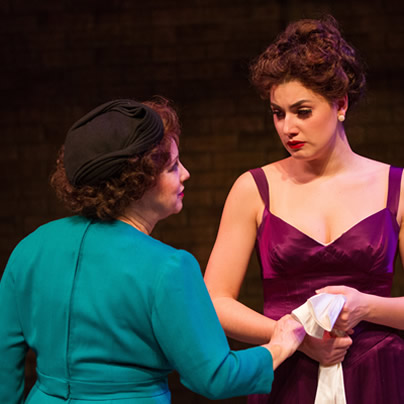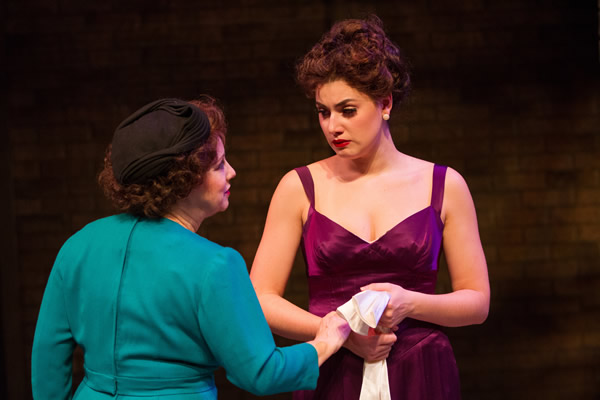Arts & Entertainment
A ‘Rose’ by any other name
Theater vet Edelen tackles iconic stage mom role in ‘Gypsy’


Sherri L. Edelen, left, as Momma Rose, and Maria Rizzo as Louise in ‘Gypsy,’ playing now at Signature Theatre. (Photo by Teresa Wood; courtesy Signature)
‘Gypsy’
Through Jan. 26
Signature Theatre
4200 Campbell Ave. Arlington
$40-99
703-820-9771
Ferocious is how director Joe Calarco describes “Gypsy’s” Momma Rose, the unstoppable stage mother who’ll do whatever it takes to make her kids stars.
Probably the most formidable woman’s part in musical theater history, Rose is frequently compared to Shakespeare’s Lear and playing her has been likened to climbing Mount Everest twice. Those who’ve tackled the part include Ethel Merman, Angela Lansbury, Bernadette Peters and more recently Patti LuPone. And now it’s local actor Sherri L. Edelen’s turn to take on the iconic role at Signature Theatre in a production staged by Calarco.
Who plays Rose always prompts discussion. To do it right requires a terrific voice, acting skills and comedic flair. And while Edelen won’t be scrutinized in the same way Broadway names inevitably are, comparisons will be made. Affable and smart, Edelen isn’t bothered: “Everyone sees how difficult and complex this woman is to play and they want to see if the actress can rise to the challenge. I let go of comparisons long ago. Every actress is different, so comparisons make no sense, really.”
But Edelen doesn’t dismiss the significance of the gig. Playing Rose is a big deal and she knows it. Until Calarco brought it up, she never thought she’d do the part. When Edelen was younger, she looked for the kind of supporting comic roles that she does so wonderfully, like the inn keeper’s unscrupulous wife in Signature’s “Les Misérables,” a superb performance for which she deservedly won a Helen Hayes Award. But as she got a little older, Edelen took on parts (and triumphed in) leading roles like Mrs. Lovett in Signature’s “Sweeney Todd” and as Margaret Johnson in “Light in the Piazza” with the Philadelphia Theatre Company. But still, Rose scared her: “She is fierce. She uses up all the energy in my body to inhabit her mind. And like those who play Lear, or any Shakespearean role really, the exploration will continue until closing and on until the next actress picks up Rose.”
“Gypsy” follows the rise of legendary stripper Gypsy Rose Lee. Set in the ‘20s, it’s an incredible backstage story featuring Momma Rose and young daughters June and Louise (later Gypsy) who criss-cross the country in pursuit of fame and fortune. The mother of all stage mothers, Rose will stop at nothing to make her girls stars on the dying Vaudeville circuit. When June quits the act, Momma focuses her suffocating attentions on the less talented Louise.
With a sensational score boasting a thrilling overture and standards like “Everything’s Coming Up Roses,” “Some People,” “Together (Small World)” and Momma’s 11th hour cri de coeur “Rose’s Turn,” “Gypsy” is routinely named by many critics to be the best Broadway musicals ever. Based loosely on Gypsy Rose Lee’s bestselling memoir, “Gypsy” premiered on Broadway in 1959. It’s the creation of true musical theater titans: Jule Styne (music), Stephen Sondheim (lyrics) and Arthur Laurents (book). Sondheim is gay, as was Laurents who died in 2011 at 93.
During an interview for the Blade in 2004, Laurents shared an anecdote. Initially when asked to write a musical based on Gypsy Rose Lee’s bestselling biography, he wasn’t interested. But not long afterward he heard some gossip at a party. Reportedly Gypsy’s mother had had affairs women and once threw a hostile hotel manager from a fifth floor window. Laurents took the assignment. And while the musical would be called “Gypsy” for contractual reasons, it’s always really been about Rose. She’s the show’s driving force.
“I wish I had one ounce of her drive and confidence,” Edelen says. “I think playing her has made me more confident, more of a fighter for my own ideals. No one believes in her dream like she does: Not Herbie (Rose’s boyfriend). Not her children. Not anyone. She has no support system but herself really and yet she has the strength and belief in herself to carry on.”
Signature’s artistic director Eric Schaeffer already had Edelen in mind when he made “Gypsy” a part of this year’s season. He never thought of bringing in a New York actor for the part. “We always wanted to do it with someone local. The talent pool here has gotten better and better, and we didn’t need to look beyond Washington. We’d done it before with Donna (Donna Migliaccio played Rose in Signature’s 2001 “Gypsy,” and plays the plum part Mezeppa the brassy stripper who bumps it with a trumpet in the current production) and it was time to give someone else the opportunity.”
Calarco, who’s worked with Edelen on eight shows, says she was ready to play Rose. In addition to having the voice, she understands comedy and is a great actress with a deep well from which to draw.
“If anyone can find the reason why Rose is so ferocious, it’s Sherri. She can explore that. Though it’s a musical, we play it like a play, focusing on Rose’s relationships with Herbie and daughter Louise (played here by Mitchell Hébert and Maria Rizzo, respectively).”
Rose isn’t much for introspection. As she sees it, she’s the ultimate loving mother doing her best to give her kids a fabulous life.
“I don‘t see Rose as a monster, the stage mother from hell, or a show off,” Edelen says. “I wanted to delve into why she operates the way she does, what is motivating her to behave the way she does. Only then can her vulnerability break through. … We all have joys and sorrows that shape us. Hopefully, if your readers come see the show, they can learn that she is vulnerable, just like everybody else and then you can understand what motivates her. Mr. Laurents tells you in his script and hands it to the audience on a silver platter, if they are listening.”

Friday, January 9
Women in Their Twenties and Thirties will be at 8 p.m. on Zoom. This is a social discussion group for queer women in the Washington, D.C. area. For more details, visit Facebook.
“Backbone Comedy” will be at 8 p.m. at As You Are. Backbone Comedy is a queer-run fundraiser comedy show at As You Are Bar DC, where comics stand up for a cause. Each show, a percentage of proceeds go to a local organization – Free Minds DC, a reentry organization for individuals impacted by incarceration. Tickets cost $19.98 and are available on Eventbrite.
Saturday, January 10
Go Gay DC will host “LGBTQ+ Community Brunch” at 11 a.m. at Freddie’s Beach Bar & Restaurant. This fun weekly event brings the DMV area LGBTQ+ community, including allies, together for delicious food and conversation. Attendance is free and more details are available on Eventbrite.
Monday, January 12
“Center Aging: Monday Coffee Klatch” will be at 10 a.m. on Zoom. This is a social hour for older LGBTQ+ adults. Guests are encouraged to bring a beverage of choice. For more information, contact Adam ([email protected]).
Genderqueer DC will be at 7 p.m. on Zoom. This is a support group for people who identify outside of the gender binary, whether you’re bigender, agender, genderfluid, or just know that you’re not 100% cis. For more details, visit genderqueerdc.org or Facebook.
Tuesday, January 13
Coming Out Discussion Group will be at 7 p.m. on Zoom. This is a safe space to share experiences about coming out and discuss topics as it relates to doing so — by sharing struggles and victories the group allows those newly coming out and who have been out for a while to learn from others. For more details, visit the group’s Facebook.
Trans Discussion Group will be at 7 p.m. on Zoom. This group is intended to provide an emotionally and physically safe space for trans people and those who may be questioning their gender identity/expression to join together in community and learn from one another. For more details, email [email protected].
Wednesday, January 14
Job Club will be at 6 p.m. on Zoom upon request. This is a weekly job support program to help job entrants and seekers, including the long-term unemployed, improve self-confidence, motivation, resilience and productivity for effective job searches and networking — allowing participants to move away from being merely “applicants” toward being “candidates.” For more information, email [email protected] or visit thedccenter.org/careers.
The DC Center for the LGBT Community will partner with House of Ruth to host “Art & Conversation” at 3 p.m. at 1827 Wiltberger St., N.W. This free workshop will involve two hours of art making, conversation, and community. Guests will explore elements of healthy relationships with a community-centered art activity. This workshop involves paint, so please dress accordingly. All materials will be provided. For more details, email [email protected].
Thursday, January 15
The DC Center’s Fresh Produce Program will be held all day at the DC Center for the LGBT Community. People will be informed on Wednesday at 5 p.m. if they are picked to receive a produce box. No proof of residency or income is required. For more information, email [email protected] or call 202-682-2245.
Virtual Yoga Class will be at 7 p.m. on Zoom. This free weekly class is a combination of yoga, breathwork and meditation that allows LGBTQ+ community members to continue their healing journey with somatic and mindfulness practices. For more details, visit the DC Center’s website.
Movies
‘Hedda’ brings queer visibility to Golden Globes
Tessa Thompson up for Best Actress for new take on Ibsen classic

The 83rd annual Golden Globes awards are set for Sunday (CBS, 8 p.m. EST). One of the many bright spots this awards season is “Hedda,” a unique LGBTQ version of the classic Henrik Ibsen story, “Hedda Gabler,” starring powerhouses Nina Hoss, Tessa Thompson and Imogen Poots. A modern reinterpretation of a timeless story, the film and its cast have already received several nominations this awards season, including a Globes nod for Best Actress for Thompson.
Writer/director Nia DaCosta was fascinated by Ibsen’s play and the enigmatic character of the deeply complex Hedda, who in the original, is stuck in a marriage she doesn’t want, and still is drawn to her former lover, Eilert.
But in DaCosta’s adaptation, there’s a fundamental difference: Eilert is being played by Hoss, and is now named Eileen.
“That name change adds this element of queerness to the story as well,” said DaCosta at a recent Golden Globes press event. “And although some people read the original play as Hedda being queer, which I find interesting, which I didn’t necessarily…it was a side effect in my movie that everyone was queer once I changed Eilert to a woman.”
She added: “But it still, for me, stayed true to the original because I was staying true to all the themes and the feelings and the sort of muckiness that I love so much about the original work.”
Thompson, who is bisexual, enjoyed playing this new version of Hedda, noting that the queer love storyline gave the film “a whole lot of knockoff effects.”
“But I think more than that, I think fundamentally something that it does is give Hedda a real foil. Another woman who’s in the world who’s making very different choices. And I think this is a film that wants to explore that piece more than Ibsen’s.”
DaCosta making it a queer story “made that kind of jump off the page and get under my skin in a way that felt really immediate,” Thompson acknowledged.
“It wants to explore sort of pathways to personhood and gaining sort of agency over one’s life. In the original piece, you have Hedda saying, ‘for once, I want to be in control of a man’s destiny,’” said Thompson.
“And I think in our piece, you see a woman struggling with trying to be in control of her own. And I thought that sort of mind, what is in the original material, but made it just, for me, make sense as a modern woman now.”
It is because of Hedda’s jealousy and envy of Eileen and her new girlfriend (Poots) that we see the character make impulsive moves.
“I think to a modern sensibility, the idea of a woman being quite jealous of another woman and acting out on that is really something that there’s not a lot of patience or grace for that in the world that we live in now,” said Thompson.
“Which I appreciate. But I do think there is something really generative. What I discovered with playing Hedda is, if it’s not left unchecked, there’s something very generative about feelings like envy and jealousy, because they point us in the direction of self. They help us understand the kind of lives that we want to live.”
Hoss actually played Hedda on stage in Berlin for several years previously.
“When I read the script, I was so surprised and mesmerized by what this decision did that there’s an Eileen instead of an Ejlert Lovborg,” said Hoss. “I was so drawn to this woman immediately.”
The deep love that is still there between Hedda and Eileen was immediately evident, as soon as the characters meet onscreen.
“If she is able to have this emotion with Eileen’s eyes, I think she isn’t yet because she doesn’t want to be vulnerable,” said Hoss. “So she doesn’t allow herself to feel that because then she could get hurt. And that’s something Eileen never got through to. So that’s the deep sadness within Eileen that she couldn’t make her feel the love, but at least these two when they meet, you feel like, ‘Oh my God, it’s not yet done with those two.’’’
Onscreen and offscreen, Thompson and Hoss loved working with each other.
“She did such great, strong choices…I looked at her transforming, which was somewhat mesmerizing, and she was really dangerous,” Hoss enthused. “It’s like when she was Hedda, I was a little bit like, but on the other hand, of course, fascinated. And that’s the thing that these humans have that are slightly dangerous. They’re also very fascinating.”
Hoss said that’s what drew Eileen to Hedda.
“I think both women want to change each other, but actually how they are is what attracts them to each other. And they’re very complimentary in that sense. So they would make up a great couple, I would believe. But the way they are right now, they’re just not good for each other. So in a way, that’s what we were talking about. I think we thought, ‘well, the background story must have been something like a chaotic, wonderful, just exploring for the first time, being in love, being out of society, doing something slightly dangerous, hidden, and then not so hidden because they would enter the Bohemian world where it was kind of okay to be queer and to celebrate yourself and to explore it.’”
But up to a certain point, because Eileen started working and was really after, ‘This is what I want to do. I want to publish, I want to become someone in the academic world,’” noted Hoss.
Poots has had her hands full playing Eileen’s love interest as she also starred in the complicated drama, “The Chronology of Water” (based on the memoir by Lydia Yuknavitch and directed by queer actress Kristen Stewart).
“Because the character in ‘Hedda’ is the only person in that triptych of women who’s acting on her impulses, despite the fact she’s incredibly, seemingly fragile, she’s the only one who has the ability to move through cowardice,” Poots acknowledged. “And that’s an interesting thing.”
Arts & Entertainment
2026 Most Eligible LGBTQ Singles nominations
We are looking for the most eligible LGBTQ singles in the Washington, D.C. region.

Are you or a friend looking to find a little love in 2026? We are looking for the most eligible LGBTQ singles in the Washington, D.C. region. Nominate you or your friends until January 23rd using the form below or by clicking HERE.
Our most eligible singles will be announced online in February. View our 2025 singles HERE.
-

 National3 days ago
National3 days agoWhat to watch for in 2026: midterms, Supreme Court, and more
-

 District of Columbia4 days ago
District of Columbia4 days agoTwo pioneering gay journalists to speak at Thursday event
-

 a&e features4 days ago
a&e features4 days agoQueer highlights of the 2026 Critics Choice Awards: Aunt Gladys, that ‘Heated Rivalry’ shoutout and more
-

 Colombia4 days ago
Colombia4 days agoBlade travels to Colombia after U.S. forces seize Maduro in Venezuela




















